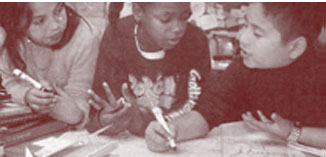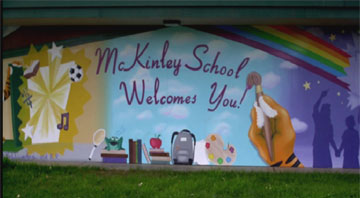



McKinley Elementary School
Franklin McKinley School District, San Jose, California
Download the Complete Year 2 Final Report on
McKinley Elementary School as a PDF file.
Download the Complete Year 1 Final Report on
McKinley Elementary School as a PDF file.
Project Overview
It is the intent of this study to examine the role of Thinking Maps® in the transformation on teacher effectiveness. In addition we will analyze how the use of the common visual language provided by Thinking Maps has facilitated teacher collaboration and communication within and across grade levels.
It is the main focus of this project to assess the impact that Thinking Maps had in the teaching effectiveness at McKinley Elementary School. We will demonstrate that Thinking Maps training and follow-up coaching have significantly impacted teacher effectiveness. In addition we will confirm that teachers have raised awareness of their own and their students’ cognitive processes.
We will prove that teachers have changed their instructional methodology after being trained in Thinking Maps resulting in significant improvement in quantitative as well as qualitative data. In addition, the data will confirm that the academic instructional level has risen from primarily knowledge based learning to higher order thinking skills such as application and synthesis.

McKinley School is a community where all are welcome. We develop a climate of empathy, respect and creativity. We value intellectual, emotional, social and physical safety for all. We pledge the courage to hold ourselves and each other to our highest academic and social expectations.
Demographics
Our research will be conducted at McKinley School. McKinley School is a K-6 school in the Franklin–McKinley School District located in San Jose, California. Eighty-seven percent of the students are English Language Learners (ELL), ninety-seven percent of the students receive free or reduced lunch, and the student annual migrancy rate is thirty-seven percent. The school is currently in its third year as a program improvement school although over the last five six years, McKinley has improved in State Test scores by 213 points.
read more
Thinking Maps Training
Thinking Maps training and instruction have improved teacher effectiveness resulting in enhancing student academic results, especially English Language Learners.
English Language Learners (ELL) represent the majority of our students at McKinley School. We wanted to prove that the instructional use of Thinking Maps® as a “non-linguistic representation” (Marzano, Classroom Instruction That Works), improved the academic skills of our ELL students. Standardized test scores as well as District Assessments and other qualitative measures will support this objective.
read more
Bloom’s Taxonomy
Instruction went from being primarily at the knowledge level (Bloom’s) to application and synthesis.
As a Program Improvement School, upon analyzing the initial “Classroom Walkthrough” data, it was clearly evident that our teachers were only instructing at the knowledge and comprehension level of Bloom’s Taxonomy. At this time, the staff realized that different tools were needed to improve the effectiveness of our instruction. As a result, we received consistent and on-going staff development in Thinking Maps®. The team will compare initial and final data gathered from the “Classroom Walkthrough’s”. We are hoping to support Eric Jensen’s statement in Brain Based Learning (1996): “Thinking Maps enable all students to access higher level thinking skills by providing a common visual language for thinking.”
read more
Staff Communication
Staff communicates more effectively within and across grade levels with the use of Thinking Maps®
Seven years ago, McKinley’s staff was fractured philosophically and emotionally. Personal opinion regarding bilingual instruction, multiple principals and numerous programs along with very low results on California State Test (CST), divided and alienated teachers. Six years ago, Aurora Garcia became the Principal at McKinley School. She was the sixth principal in during one school year. Mrs. Garcia brought consistency and created a physically, socially and emotionally safe environment. The staff spent endless hours coming to an agreement on the school vision as well as professional and student norms. However, grade-level collaboration skills were still lacking. Using grade-level collaboration forms and Thinking Maps® created during grade level and staff meetings, we will prove that collaboration is more effective and less derogatory.
read more
Changing Methodology
Teachers have changed their methodology as evidenced by their lesson plans after being trained in Thinking Maps®.
Prior to Thinking Maps®, lesson plans reflected activities for students to perform instead of developing their higher level thinking skills. By comparing the lesson plans before and after Thinking Maps® training, we will demonstrate that teachers have changed their instructional paradigm.
read more
See the Menu on the left column at the top of this page for more sections in this case study on McKinley Elementary School in San Jose, California.
Download the Reports
Download the Complete Year 2 Final Report on
McKinley Elementary School as a PDF file.
Download the Complete Year 1 Final Report on
McKinley Elementary School as a PDF file.